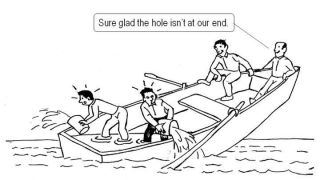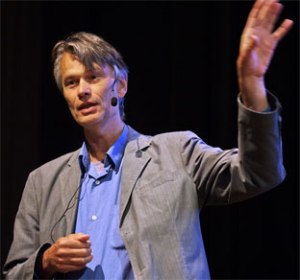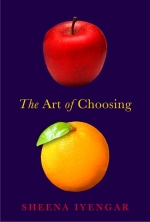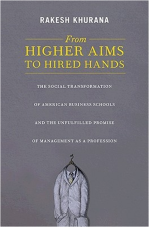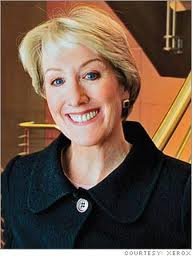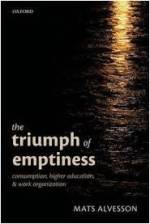 Review by Philip Warwick
Review by Philip Warwick
Mats Alvesson’s latest work centres on the depiction of three contemporary conditions of modern western society: grandiosity, illusion tricks and zero sum games; principle among these being grandiosity. Alvesson argues that behind the seemingly impressive façades, there is little to show for consumption, economic growth, prosperity or mass higher education. He ends the book with the rather downbeat conclusion… underlying the grandiose society’s illusion tricks is the triumph of emptiness.
Key words
Sociology, leadership, higher education, economics, consumption, consumer behavior.
Summary
The stated purpose of the book is to consider the nature of modern society, which Alvesson variously describes as post-affluent, a society where quality has been traded for quantity, where there has been an erosion of trust, where narcissism dominates our actions and where functional stupidity means that all of us are unwilling to use our critical faculties in our home and working lives; in other words, a place where it is easier to believe the hype and not to think too hard about things.
In a culture of grandiosity individuals pump-up their CV and inflate their job titles; while governments make great claims about the benefits to be derived from a world class education or health system and through press release and sound bite, they tell a story of upwardly mobile performance indicators or downward trends in unemployment figures. But all the hype is masking what Alvesson describes as a zero sum game; where one person’s gain or one organisation’s gain is another’s loss. If everyone can afford the same type of expensive designer clothes they lose their value. If everyone has a degree, then there is no benefit to having a degree, if one person gets the new job several others do not.
Illusion tricks complete the gloomy picture of contemporary society. These tricks place all their emphasis on conveying positive images rather than the substance of the message. The pressure to constantly present a positive picture, leads to an all pervading need to present an improved image of reality.
The focus of the anlaysis is on three largely unrelated areas: consumption; higher education and work and organizations. There are two chapters on each topic, the section on higher education being the most relevant to readers of GlobalEd.
Alvesson announces to the reader that he is not someone seduced by consumption (the proof of his immunity being that he does not choose to own a car); however, the rest of post-affluent western society suffers from a consumption paradox. The more that is consumed the more is demanded and in general the less happy everyone is. Alvesson’s chapters on consumption cover the same sort of territory as Zygmunt Bauman and draws on the work of other well read authors like George Ritzer, Naomi Klien. Perhaps he aspires to have the same impact? The chapters on work and organisation cover the nature of work in contemporary society with insights into leadership and organisational narcissism.
Mats Alvesson on leadership
The massification of higher education has undoubtedly created many problems but Alvesson’s analysis in the two chapters on higher education is more senior common room rant, rather than insightful observation. There is much talk of inferior vocational colleges that have become universities and sneers at what he calls light-weight courses in a range of subjects which he felt the need to stereotype as Beverage Management.
Nursing Studies is one of the light-weight higher education subjects he attacks. Alvesson clearly does not think that nurses should be awarded degrees. Nursing is also in the firing line in the third section on work and organisations. He seems to feel that the professionalization of nursing has led to a reduction in the quality of care in hospitals. Nurses, he suggests, have become rather grandiose about their role and no longer want to perform the caring that should be the staple of their role. Whilst there may be some justification for worrying about the standard of care afforded to patients in health care institutions, Alvesson’s argument largely ignores the significant developments in medical technology and pharmaceutical sciences that have come along since Florence Nightingale got to work in the 1860s. Other trades that seek to become professionalised are similarly frowned-on.

Alvesson questions the relevance of ‘light weight’ higher education, as for example the Nursing course.
The evidence presented is culled from a wide range of sources most of the data quoted being from Alvesson’s reading. For example he frequently cites Arum and Rosksa’s 2011 book (Academically Adrift: limited learning on College Campuses, Chicago, Chicago University Press) in order to justify his argument that students are bored and would be better off not undertaking university degree programmes. Little evidence is presented that might counter this view. More frustratingly, many of the observations on the state of higher education seemed to be the anecdotal observations of his colleagues and contacts made at a series of major international conferences that he attends while working on the book.
The use of the word major annoyed me. Why would someone writing a book about grandiosity and pomposity feel the need to tell his readers that he was on his way to a major conference? Why do we need to know that he was invited to speak at a conference in Canada? Presumably it is to boost the status of the writer in the eyes of the reader. Is that not grandiosity in an academic context? Using the zero sum game principle, by implication the conferences that the rest of us attend are minor conferences.
Some of you will love reading the anecdotes about the inadequacies of degree courses in Spa Management and Surfing Studies and will scoff with incredulity when they are told that a top UK University has a module on Harry Potter. It is a reasonably entertaining piece of popular sociology ideal for grumpy academics. Others readers will not take to it and will think that it is rather pompous in its tone.
Senior Teaching Fellow
Durham University Business School
Prior to entering academic life Philip spent 17 years working as a manager in the National Health Service (NHS) in Yorkshire and the north east of England. While still a manager in the NHS he studied for a part-time MBA at Durham Business School. In 2000, he joined the University of York, where he stayed until moving to Durham in autumn 2012.
Philip has two main areas of research interest and activity, public sector strategy and internationalisation and the scholarship of teaching and learning. His public sector strategy interest encompasses health service management and university management, in particular the international business in higher education, which is the subject of his doctoral research. Much of his work in the field of teaching and learning also relates to internationalising teaching and learning, making teaching and learning more appropriate and relevant to an international audience.
See also:
Other Book Reviews
The Triumph of Emptiness: Consumption, Higher Education, and Work Organization, by Mats Alvesson
Times Higher Education: “As a psychologist, I expected to have trouble with the sociological orientation of The Triumph of Emptiness, but it began to grow on me as I read, forcing me to reflect on many aspects of our consumer-based society, on the shift in higher education away from scholarship to metrics, and on a workplace that has become less loyal, more short-termist and lacking the kind of leadership the future requires.”
New Book Debunks Myth of Knowledge Economy
Lund Business Review: “Ever wondered why there are so many ‘Vice Presidents’ at your workplace? Or how everyone can have a complex-sounding degree, when there are university courses on Star Trek? Do you feel like the nice suits, Power Points and corporate speak are increasingly meaningless? According to Professor Mats Alvesson, these are only some of the ‘illusion tricks’ we deploy in our post-affluent Western society.”
Related Articles
Business school performance culture. Are we targeting the right things?
 Those of us working in higher education at the moment must recognise that some of the targets to which are business schools work are leading to dysfunctional outcomes, for example staff being taken away from front line teaching and student support duties so that they can write articles for obscure academic journals.
Those of us working in higher education at the moment must recognise that some of the targets to which are business schools work are leading to dysfunctional outcomes, for example staff being taken away from front line teaching and student support duties so that they can write articles for obscure academic journals.
BOOK REVIEW: “The Luxury Strategy: Break the Rules of Marketing to Build Luxury Brands” by J.N. Kapferer & V. Bastien
 If you are currently spending a few weeks in a vacational coastal city of your country, jealously admiring the ostentatious wealth of the rich and famous, this book may interest you. It defines what constitutes a luxury product and how companies develop their strategies to profit from this status.
If you are currently spending a few weeks in a vacational coastal city of your country, jealously admiring the ostentatious wealth of the rich and famous, this book may interest you. It defines what constitutes a luxury product and how companies develop their strategies to profit from this status.


